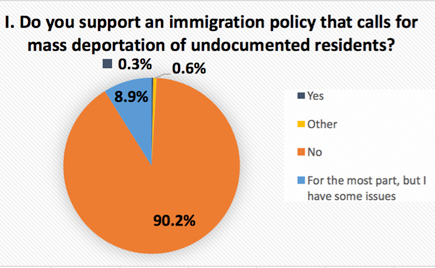Millennial Caucus on Immigration and Refugees
 Source: The Millennial Caucus, February 2016
Source: The Millennial Caucus, February 2016
Undergraduates at the University of Virginia favor a more accommodating stance on Syrian refugees while largely opposing the deportation of undocumented immigrants according to a February 2016 poll conducted by undergraduates in concert with the Miller Center. These views contrast significantly with national averages in both areas.
As seen in Figure I, prevailing opinion on Grounds stands against mass deportation of undocumented residents. Less than 10% of undergraduates favor deportation, with the vast majority of that group supporting the policy only with reservations. Meanwhile, according to an August Gallup poll, 19% of U.S. adults favor deportation.
A general theme among those answering “no” is a call for a more accessible “path for people to gain citizenship.” In their eyes, mass deportation of illegal immigrants is an “approval [of] hatred and racial profiling” as well as “un-American.”
Meanwhile, those who agree with relocation but only “in principle” take issue with the “impracticality” of expelling such a large portion of the population. In the words of one student, relocating 11 million people would be a “logistical impossibility.”
Prevailing opinion on Grounds more closely aligns with the platforms of the two Democratic candidates for president. Both Bernie Sanders and Hillary Clinton advocate some form of a path to citizenship, whether it is through amnesty or pushing the D.R.E.A.M. Act through Congress.
The group that answered yes but with reservations tracks closely with John Kasich. The Ohio governor has broken ranks from the rest of the GOP pack, calling the proposal “unrealistic” in multiple debates and stating that those who are following the law “should stay.” The Republican front-runners—businessman Donald Trump and Senator Ted Cruz—support deportation.
The overwhelming majority of UVA undergraduates—more than 90%—also believe that the government should accept more Syrian refugees, although a third of this group agreed only “in small numbers.”

One student stated that the United States has a “moral responsibility” to help those fleeing what another deemed a “common enemy.” Others argued that accepting refugees is a good political strategy, predicting that if refugees are denied asylum, they could quickly become radicalized, with the United States a prime “target of this radicalization.”
The minority view (roughly 5%) is that taking in refugees would create a domestic security risk, and that America has a responsibility to its people first.
These numbers are a significant departure from national opinion. A December Quinnipiac University poll shows that 51% of voters “oppose refugees entering the United States” while only 43% were in support.
This article was written with the support of my Co-Lead and Advisory Council: Darby Hobbs, Brett Curtis, Lauren Horne, Charles Hershman, Anna Wickham, Jay Boyd, Francesca Callicotte, and Jonathan Jackson.
The Millennial Caucus is a student-led initiative that promotes the views of undergraduate students from the University of Virginia on the topics covered by the Miller Center’s First Year 2017 project. This survey was conducted in February 2016 and had a 14% response rate and + 5 margin of error.
For more about this project, please visit About the Millennial Caucus located on the Miller Center’s First Year 2017.